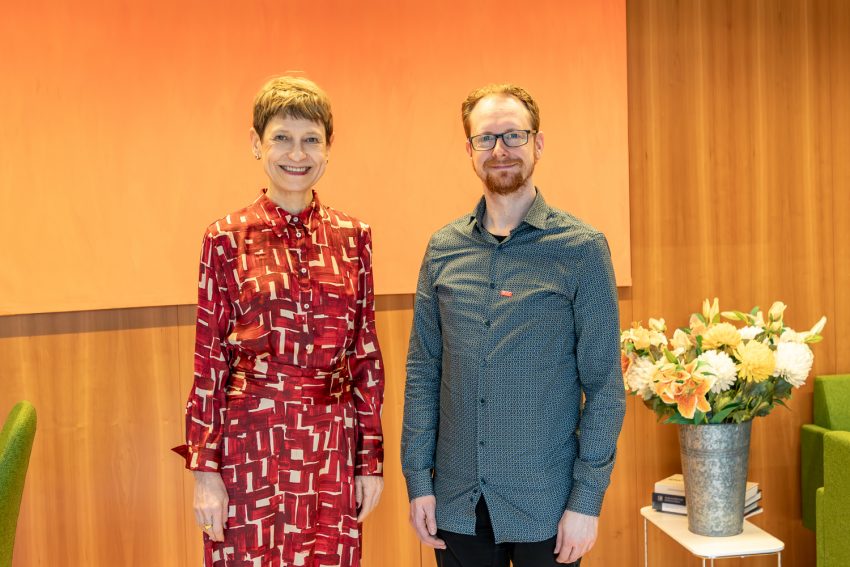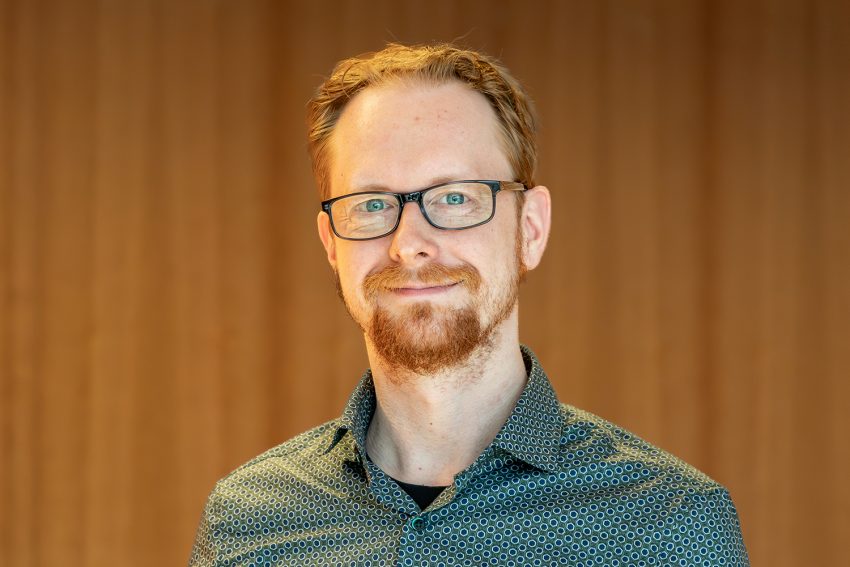“Fascinated by how things work in detail” Julian Hegemann is Professor at the Institute of Pharmaceutical Biology
On 1 February 2025, Julian Hegemann was appointed Professor at the Institute of Pharmaceutical Biology at TU Braunschweig. After completing his PhD in Marburg, he worked as a postdoctoral fellow at University of Illinois at Urbana-Champaign (USA), TU Berlin and the Helmholtz Institute for Pharmaceutical Research Saarland. Professor Hegemann’s research focuses on bacterial natural products that can be used as a basis for the development of new pharmaceutical compounds, such as antibiotics.

Professor Julian Hegemann with President Angela Ittel. Photo credits: Kristina Rottig/TU Braunschweig
Why did you choose TU Braunschweig?
TU Braunschweig offers an attractive working environment for our research. The combined expertise in natural products in this city, but also in other relevant research areas, from which my team and I can also benefit, gives us special opportunities for this kind of work and provides impulses with which we can further develop our research in new directions. Another plus for me personally is the rich cultural and artistic life, not only in Braunschweig itself, but also in surrounding cities such as Hamburg, Berlin and Leipzig. This makes it easy to combine the positive aspects of work and life.
What exactly are you working on in your research?
Our research focuses on natural products that belong to the superfamily of ribosomally synthesised and post-translationally modified peptides (RiPPs). We are investigating the mechanisms of biosynthesis of these compounds and how we can use and modify them to induce bacteria to produce new variants of these compounds. This effort is complemented by the search for new compounds through the analysis of known bacterial genomes.
One of the main interests is to find out when and how these peptides are produced and for what reasons. After all, nature would not make such compounds just for fun or for their structural aesthetics. Under evolutionary pressure, such compounds are tailor-made for specific functions. What might these functions be? Could they be signalling molecules that mediate interactions between cells of the same or even different bacterial species? If so, how do they affect bacterial communities? What effect do they have on plants, animals or humans? Or do they have an antimicrobial effect, providing us with blueprints for the development of new antibiotics?
These are all questions that intrigue us and that we want to investigate, and this work also leads to a variety of interfaces for collaborations with other research groups, both here in Braunschweig and worldwide.
What research topics and projects will you be working on at TU Braunschweig?
Our current research focuses on the so-called lasso peptides and lanthipeptides. We are fascinated by the high stability of these chemically rather simple compounds. In Braunschweig, we will initially focus on an antifungal lanthipeptide and explore its potential as a new pharmaceutical compound. In another project, we will investigate the stability of a specific antimicrobial lasso peptide. Can we improve its stability to make it more likely that such compounds will be used as medicine?
We are also developing methods that allow us to remove specific parts of these compounds and then replace them with other chemical groups. The aim is to create lasso peptides that have never been seen in nature in this form.
What motivated you to conduct research in this area?
I have always been fascinated by how things work in detail. This explains my career path from a chemist, who is more concerned with the synthesis of molecules and catalysis, to a biochemist, who studies how life works at the molecular level. Over the years, this has led me to develop a keen interest in natural products, particularly RiPPs. I really enjoy exploring these compounds, gathering new data on their biosynthesis and effects, and thinking about possible uses for them.
How would you describe your typical day at work in three words?
Creativity, communication, coffee

